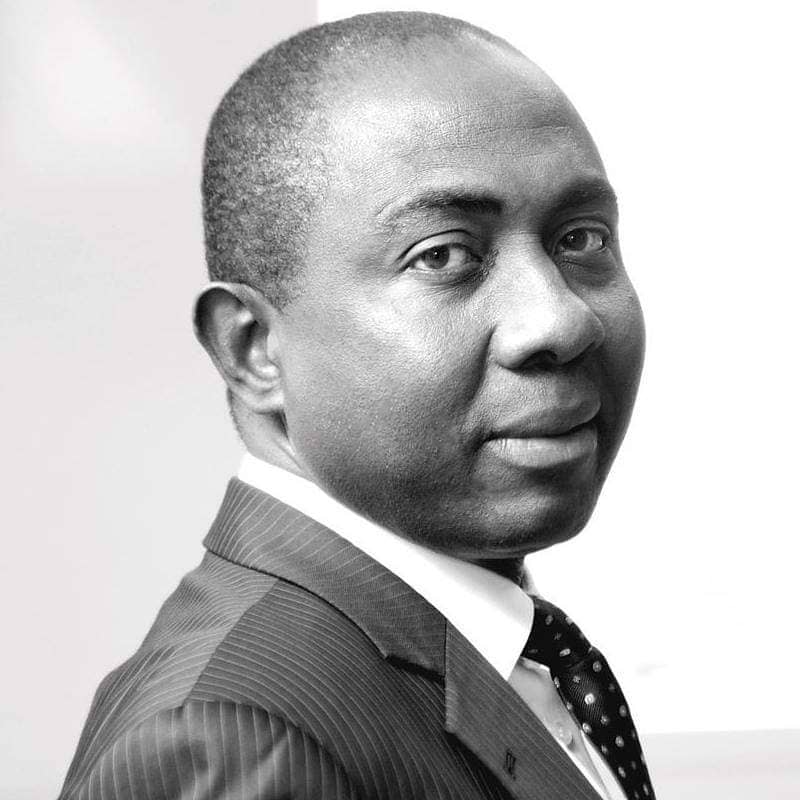By AKIN OLANIYAN

The social media is a brutal battleground and it is no surprise that some of the debates around the age-old question of what truly constitutes value takes place online rather than in more sacred places. The recent public spat pitting industrialist Cosmas Maduka and micro-celebrity, Cubana Chief Priest, over the phrase “Money Na Water” is another of those serious debates, which we have to conduct on social media. However, we would be mistaken if we allow the matter to be swept under the news feeds of social media because this goes well beyond a simple disagreement about spending habits. Given the personalities involved and their observed mindsets, this looks every inch like a profound philosophical clash between two competing economic realities – old money, one built on the tangible assets of the factory floor; and new money, the other one built on the intangible currency of the Instagram feed. At the crux of the issue is the question of legitimacy, power, and wealth in a modernising African country like Nigeria where people are still struggling to define personal and group identities in a digital age.
The immediate cause of the spat sounds like a sermon from the altar of industry. Cosmas Maduka, the founder of the Coscharis Group, a man whose storied rise from hawking on the streets of Jos to automotive billionaire, expressed his disdain for the performative, made-for-Instagram lifestyle of the social media segment of the nouveau riche, essentially describing it as self-serving. True-to-form, he framed the issue as a moral challenge to the conservative code well established Nigerian billionaires like Tony Elumelu and Femi Otedola hold dear. For Maduka, the “Money Na Water” mindset is not just irresponsible; it is a violation of core principles and values. His comments appeared to have angered Pascal Okechukwu, the Cubana Chief Priest, the poster boy for the lifestyle that Maduka abhors. His wealth does not come from silent factories like Maduka’s but rather from the loud, visible consumption. His is the wealth personified in the ritualised spraying of dollar bills, the popping of champagne in the glare of ring lights, the curated and sometimes inflated packaging of a ‘life without scarcity.’ His angry response to Maduka’s comments was not a point-by-point defence but a reassertion of his reality. He simply dismissed the industrialist’s critique as “bad belle,” and framed his success as its own justification. His model is simple: visibility is viability, and social capital is the highest form of currency.
This controversy, however, is a classic clash between the cultural codes of Old Money and New Money; a conflict rooted in history, values, and social behaviour, where the very definition of “class” has long been contested. There is not attempt here to pick sides. The issue is as complex and contradictory as the Nigerian economy itself and won’t survive a simple binary assessment. Again, we have to stress, this controversy is not really about who is wealthy, but rather about the fundamental nature of capital and the rules of the economic games that produces it. Cosmas Maduka’s game focuses on assets and long-term investments, while Cubana Chief Priest favours the idea of squeezing money from likes, shares, and direct on engagement social media. To attempt to judge one by the rules of the other is to support a fundamental misunderstanding.
In Maduka’s world of economic tangibles, money must be built on brick and value and to understand his angst is to understand an ecosystem he helped to build and which now defines his very being. For the industrialist and others like him, wealth is rooted in what can be seen, touched, and quantified on a balance sheet. In the Nigerian context, this is as close as you probably will get to old capital, or the self-made industrial wealth built from the ground up. To the credit of people like Maduka, the power and influence they wield come from what the French sociologist Pierre Bourdieu would define as economic and cultural capital. The Coscharis headquarters, its automobile assembly plants, its vast distribution networks represent durable assets, whose value can be calculated through traditional accounting, audited by firms, and understood by global markets. Without sounding like taking sides – we said we would not – this looks like capital that has weight and substance.
Check and you would see that his cultural capital is the hard-won business acumen, a reputation for reliability and grit built not over a viral season, but over decades of navigating the turbulent waters of the Nigerian business environment. In the world of people like Maduka, “adding value” is not just a metaphor; but rather a concrete, measurable act. Here, you manufacture a car, you create jobs for hundreds, you solve a logistical problem that moves goods from one point to another and money, in this context, is primarily a tool for creating more value. So, when he recoils at the phrase “Money Na Water,” we can understand that it is because it contradicts his logic of the real economy, where the rules of engagement are disciplined, slow, and ultimately measured in productivity, market share, and value. The idea of money being “water,” something that flows freely and which has the potential to evaporate, is alien to people like Maduka and makes little sense.
In stark contrast, Cubana Chief Priest and people like him operate in the economy of Intangibles, where money is a current and attention is the asset. For him and the others who have mastered the art, the attention economy of intangibles pays handsomely for as long as they are able to moblilise and retain the scarcest and most valuable resource – the focused gaze of the crowd. Cubana Chief Priest’s capital is almost entirely social and symbolic and if we consider the “investment” to maintain status, we can consider his network – his access to A-list celebrities, influential politicians, and a massive, engaged digital following – as his primary ledger. For micro-celebrities like him, perception, aspiration, and cultural relevance is everything, hence his brand, “Cubana Chief Priest,” has to be the most valuable and fragile asset.
The “Money Na Water” controversy is another powerful symptom of a global economic transformation that is happening at hyper-speed within Nigeria’s borders.
On this side, and given the “fragile” nature of the foundation on which their capital is built, the “Money Na Water” philosophy should not be seen as economic illiteracy; but a strategic doctrine for survival and dominance in this new landscape where make-belief is everything. The reckless spending that Maduka’s worldview considers as frivolous consumption is, in fact, a crucial and calculated investment in brand equity. It is social media marketing in its purest, most performative form. Each sprayed note – and the video of that moment – is not just a waste; it is a commercial for his brand’s success, a public ritual that reinforces his symbolic power as a “successful micro-celebrity” which in turn attracts more followers and ultimately more money from platform owners; lucrative endorsements; and partnerships. Here is the key difference: his value is not in what he produces, but in his made-for-Instagram ability to influence, to trend, to capture – and hold – public attention and sell it to the platforms. In his economy, the public show of frivolous spending is the foundation. Stopping “the show” – and imposing the frugal discipline of Cosmas Maduka – would be self-immolation. This will cause the entire edifice to crumble into algorithmic obscurity.
It is in this fundamental divergence that we have to situate the public spat – Maduka, from his factory floor, seeing Cubana’s spending as the endpoint; Cubana, from his Instagram feed, seeing the very same spending as the essential fuel for his business model of continuous engagement and influence. Is it possible that both men are observing the same action but interpreting it through entirely different economic logics, one rooted in production, the other in perception? Maybe the spat offers us an opportunity to interrogate the unsettling vulnerabilities of each model. We know The Factory Floor is solid; but sometimes vulnerable to macroeconomic shifts and unexpected policy changes. Though formidable, it suffers from its sluggish response to the speed of the Internet. On the other hand, The Instagram Feed is hopelessly weak because its value depends algorithmic rules and the unstable nature of public sentiment, which can be with you today and be gone tomorrow no thanks to a single scandal, a platform policy change, or a shift in the cultural wind. It offers high-risk, high-reward liquidity.
The natural temptation for any observer is to choose a side, and we have vowed to not do that here. I think by far the critical and intellectually demanding task is to recognise that Nigeria’s fractured economic future is currently caught between these two worldviews, each offering a different path to wealth. Look around and you would be tempted to believe that these two economies are becoming increasingly interdependent, whether the purists on either side like it or not. The “Factory Floor” desperately needs the “Instagram Feed” for modern marketing, brand relevance, and connecting with a new generation of consumers like Gen Z. Conversely, the “Instagram Feed” ultimately relies on the “Floor” for the physical goods – the cars, the drinks, the fashion items, the bank accounts – that it promotes; often glamorises and relies upon for “legitimacy.” As outrageous as it would sound, the most promising path forward for a dynamic Nigerian economy may not lie in choosing one over the other, but in forging a potent collaboration: cultivating a new generation of entrepreneurs who understand the attention economy and are able to build substantive, value-creating businesses that provide real jobs and solutions, while also masterfully leveraging the immense power of digital influence to scale them and connect with a global audience.
The “Money Na Water” controversy is another powerful symptom of a global economic transformation that is happening at hyper-speed within Nigeria’s borders. It is a painful, messy, but necessary national conversation about value, legitimacy, and the very nature of capital in a digital age. The question for Nigeria is no longer whether money is water or a brick. The question is whether the nation can mature into an economic system sophisticated enough to understand the strategic power of both the reservoir and the fortress, and wise enough to build a future that does not crumble under the weight of its bricks or evaporate in the heat of its own spectacle. The stakes are nothing less than the model for the next generation of Naija hustle.
*Dr. Olaniyan, Convener, Centre for Social Media Research, Lagos writes on Digital Culture.
READ ALSO:
When your idea becomes a name, guard it before it becomes a ghost
A new dawn: What Nigeria’s exit from FATF grey list means
Senate confirms new service chiefs
Rumours, more rumours, and still more rumours…
How to scale fintech without funding, By Rarzack Olaegbe














